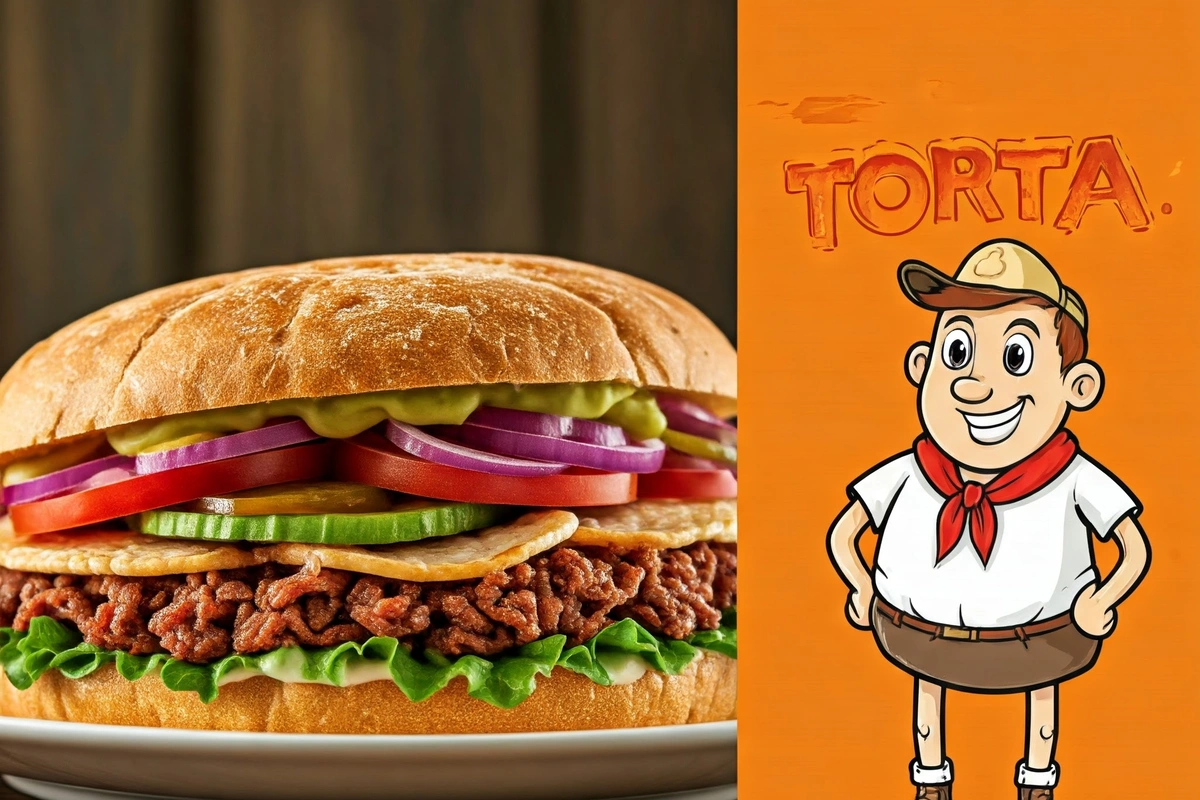Torta Meaning: Unveiling The Slang & Culinary Worlds!
Ever stumbled upon a word that seems to have a life of its own, shape-shifting with every new context? The word "torta" is one such chameleon, a linguistic puzzle that can mean anything from a delectable sandwich to a not-so-flattering descriptor. Join us as we unravel the intricate web of meanings behind this seemingly simple word, exploring its journey through cultures, cuisines, and colloquialisms.
The term "torta" is a fascinating example of how language evolves and adapts, taking on new shades of meaning over time. While it's a common word in Spanish, its usage and connotations vary significantly depending on the region and social context. From its culinary roots to its modern slang interpretations, "torta" offers a glimpse into the dynamic nature of language and its power to reflect cultural values and attitudes.
| Aspect | Details |
|---|---|
| Etymology | Derived from Latin "torta pnis," meaning "a roll of bread." Influenced by "tortus" (twisted, folded) or "turta" (type of pastry). |
| Culinary Meanings | Cake, pie (South America, Europe, Philippines). Sandwich (Mexico, US). Flatbread, omelette (depending on cuisine). |
| Slang Meanings | "Slap on the face" (Torta/tortazo). Clumsy/awkward person (internet slang). Derogatory term for obese/lesbian woman (some Spanish dialects). Funny/silly person (Spanish slang). |
| Regional Variations | Mexico: Sandwich, curvy person, bold personality. Spain: Can refer to a type of cake or be a derogatory term. Costa Rica: "Pull a cake" - making a mess. |
| Figurative Usage | Overlaps with "pan" (bread) or "bollo" (bun) but with unique nuances. |
| First Slang Use | Recorded in 1995 to refer to larger women, linked to the sandwich of the same name. |
| Cultural Sensitivity | Meaning can be offensive depending on context and intent. Understanding the cultural nuances is vital. |
| References | Urban Dictionary |
For foodies, the word "torta" might conjure images of a savory Mexican sandwich, bursting with flavorful fillings. In this context, a "torta" is a hearty meal, typically consisting of a soft, round bread roll called a telera or bolillo, stuffed with ingredients like meat, cheese, avocado, tomato, and lettuce. However, the culinary definition of "torta" extends far beyond the borders of Mexico, encompassing a diverse range of dishes from cakes and pies in South America, Europe, and the Philippines, to flatbreads and omelettes in other regions.
- Movierulz 2025 Your Guide To South Indian Cinema Legal Sites
- Kannada Movies Online Watch Free Vs Legal Streaming Guide
But what happens when "torta" ventures beyond the realm of cuisine and enters the world of slang? This is where things get interesting, and potentially confusing. In Mexican slang, "torta" can take on several different meanings, depending on the context. It might refer to a "curvy person," drawing a parallel between the fullness of a sandwich and the shape of a woman's body. Alternatively, it can describe someone with a "bold personality," perhaps suggesting that they are as packed with character as a well-made torta is with ingredients. Understanding these nuances is crucial for navigating conversations and avoiding potential misunderstandings.
However, the slang usage of "torta" isn't always positive. In some varieties of Spanish, particularly within certain communities, "torta" can be a derogatory term for a fat or lesbian woman. This usage is rooted in harmful stereotypes and reflects a history of prejudice and discrimination. It's important to be aware of this potential meaning and to avoid using the word in a way that could be hurtful or offensive.
The evolution of "torta" from a simple culinary term to a complex slang word is a testament to the dynamic nature of language. As cultures interact and evolve, words take on new meanings, reflecting changing social attitudes and values. The rise of internet slang has further accelerated this process, with terms like "torta" finding new life online as descriptors for everything from clumsy individuals to awkward situations.
- Yumieto Leak The Controversy Impact Whats Next
- The Truth Is Jonathan Roumie Married Wife Rumors Facts
On the internet, "torta" can be used to poke fun at someone's ineptitude or lack of coordination. For example, if someone spills their coffee or trips over their own feet, they might be jokingly referred to as a "torta." This usage is generally lighthearted and intended as a playful jab rather than a serious insult. However, it's important to be mindful of the potential for misinterpretation and to avoid using the term in a way that could be perceived as mean-spirited or bullying.
The term "torta" also has a history of being used as a derogatory term, particularly towards women. Since a torta is a type of sandwich, Mexican Americans have used the term to refer to large women, going back to the '90s. The first recorded use of "torta" as a slang term was in 1995. This usage is considered offensive and should be avoided.
In Spain, "torta" takes on yet another layer of meaning. While it can refer to a type of cake, it's also sometimes used as a slang term for lesbians. The phrase "la vida es corta, hacete torta" (life is short, make yourself a "torta") is sometimes used to encourage women to embrace their lesbian identity. This usage is specific to certain Spanish-speaking communities and may not be widely understood in other regions.
Adding to the complexity, "torta" and "tortazo" are also slang terms for "slap on the face," although "tortazo" can also refer to getting a pie thrown in your face. This meaning is quite different from the culinary and derogatory connotations, highlighting the word's versatility and potential for confusion.
The origin of the slang term "torta" is often debated, but one common theory is that it's derived from the visual resemblance between a stacked sandwich and a person with a larger physique. This connection, however, is considered insensitive and perpetuates harmful stereotypes about body image. It's crucial to be aware of these associations and to avoid using the term in a way that could contribute to body shaming or discrimination.
Given the diverse range of meanings and connotations associated with "torta," it's essential to approach the term with caution and sensitivity. Before using the word, consider your audience, the context of the conversation, and the potential for misinterpretation. If you're unsure about how the word might be received, it's best to err on the side of caution and choose a different term.
Understanding the cultural context is paramount when interpreting the meaning of "torta." In some cultures, the term might simply refer to a type of food, while in others, it could carry significant social and political baggage. By researching the local customs and attitudes surrounding the word, you can avoid making unintentional offensive or insensitive remarks.
Ultimately, the meaning of "torta" is fluid and subjective, shaped by individual experiences and cultural norms. What might be considered a harmless joke in one context could be deeply offensive in another. By embracing cultural sensitivity and practicing mindful communication, we can navigate the complexities of language and foster respectful dialogue across different communities.
To illustrate the varied usage, consider the following examples. "John tried to bake a cake but accidentally dropped the bowl, spilling the batter all over the kitchen counter; what a torta!" Here, "torta" signifies clumsiness. Conversely, imagine a conversation: "Bro, supiste Claudia sali del clset?" (Bro, did you know Claudia came out of the closet?) "Pfff, se le notaba lo torta, le encanta Haley Kiyoko y Girl in Red" (Pfff, it was obvious she was a "torta," she loves Haley Kiyoko and Girl in Red). In this instance, "torta" is used (though potentially offensively, depending on context) to mean lesbian.
The Spanish language itself provides clues to the word's evolution. "Torta pnis f sg" literally translates to "a roll of bread." The word's origin could stem from "tortus" (twisted, folded over), describing the bread's form, or from "turta" (a type of pastry). This etymological background highlights the word's deep connection to food and its subsequent metaphorical extensions.
Furthermore, "torta" can even function as slang for "ass" or "butt," though considerably less formal than "nalgas." For example, the phrase "no mires mis tortas" translates to "don't look at my "tortas"." In this context, the word takes on a playful, informal tone.
Adding to the word's complexity, there's the Costa Rican slang phrase, which translates to "pull a cake." This expression is used when someone makes a mess or does something wrong and then gets in trouble for it. It's a colorful way to describe a situation where someone's actions backfire.
Then, there's the usage describing a "thicc Mexican or Hispanic mami," one step above "gorditas" on the size scale. This definition highlights how the word can be used to describe body types, though such usage often treads into potentially objectifying territory.
The variety of meanings associated with "torta" underscores the importance of understanding context and regional variations. Words rarely exist in a vacuum, and their interpretations are deeply influenced by cultural nuances and social norms. By acknowledging these complexities, we can avoid misunderstandings and use language in a more responsible and respectful manner.
It's crucial to remember that while slang can be fun and expressive, it can also be exclusionary and offensive. When using a word like "torta," it's essential to consider the potential impact on your audience and to choose your words carefully. By being mindful of the cultural context and avoiding harmful stereotypes, we can use language to build bridges and foster understanding across different communities.
The journey of "torta" from a humble bread roll to a multifaceted slang term is a fascinating illustration of the ever-evolving nature of language. By exploring its diverse meanings and connotations, we gain a deeper appreciation for the power of words to shape our perceptions, reflect our values, and connect us to one another. So, the next time you hear the word "torta," take a moment to consider its rich history and its potential for both culinary delight and cultural understanding.
In conclusion, the word "torta" serves as a compelling reminder that language is never static. Its meaning is constantly being negotiated and redefined by the communities that use it. By embracing curiosity, empathy, and a commitment to mindful communication, we can navigate the complexities of language and build a more inclusive and understanding world.
Ultimately, understanding torta requires more than just knowing its dictionary definitions; it demands cultural awareness, sensitivity to context, and a recognition that language is a living, breathing entity constantly evolving with the societies that use it.
- Movierulz 2025 Watch Telugu Movies Online Free Guide Review
- Anna Malygon Leaks The Truth About Maligoshik Onlyfans More

What is Torta in Mexican Slang? Meaning & Variations

What is Torta in Mexican Slang? Meaning & Variations

What Does Torta Mean in Mexican Slang? Effierecipes